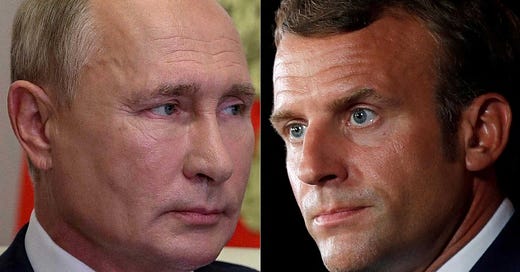There seems to be a widespread ignorance about the historical suffering World War II inflicted upon Europe and the US.
NATO member countries seem to have forgotten the horrors of the Second World War and the true nature of war, whereas Russia has not.
Twenty-seven million Russians perished – the horror of war is deeply ingrained in their memory.
On February 22, 2024, French President Emmanuel Macron addressed European leaders in Paris at a conference aimed at expediting weapon and financial aid deliveries to Ukraine.
Macron stressed that Russia 'must not and cannot win this war' in Ukraine, highlighting Moscow’s recent actions as a looming threat to NATO.
It’s a narrative, NATO and the US have been falsely running to justify their efforts to destabilise Russia and remove President Vladimir Putin from power.
Putin has repeatedly stated Russia has no ambitions to control Ukraine or confront NATO directly.
Yet, it appears that the historical lessons are either being ignored by NATO or that its leadership is recklessly pushing towards a conflict they are ill-prepared for.
Days after Macron’s overly confident speech, Putin’s annual State of the Nation address to the Russian parliament was a stark warning to the US and NATO, putting the West on high alert and sending a shiver down the spine of the international community.
Putin was clear: any deployment of US and NATO ground forces to Ukraine would cross a definitive red line, potentially triggering a catastrophic escalation for humanity.
The warning follows what Putin characterises as a desperate and reckless strategy by the West, endangering not only Russian sovereignty but the fabric of international peace and security.
His address wasn’t just a routine speech; it was a deliberate message to the West.
By framing the potential deployment of US and NATO troops in Ukraine as a red line, he emphasised the gravity of Macron’s threats.
Putin’s words signify a shift from regional conflict to global crisis, underscoring the risks of direct confrontation between nuclear-armed states.
The spectre of a Third World War and the West’s determination to provoke Russia is a scenario the world can’t afford to overlook.
Putin’s warning is pivotal for understanding the current geopolitical dynamics.
America and NATO are facing a significant setback. Their attempt to initiate a proxy war through Ukraine, aiming to oust the Russian President, has backfired spectacularly.
To divert attention from their strategic blunder, the US and NATO are considering escalating the conflict by deploying ground forces.
According to Putin, it’s a desperate move to shift focus away from a failed proxy war.
It’s a compelling narrative: the West, failing to achieve its objectives indirectly, is now contemplating a direct and perilous escalation.
Deploying ground forces is a high-stakes gamble.
Viewed by Putin and many analysts as reckless, it underestimates Russia’s response and overlooks the complexity of the conflict.
Escalating from a proxy to a direct war could expand the conflict, drawing in additional countries and potentially leading to a full-scale global confrontation.
By deploying troops to Ukraine, the US and NATO are challenging Russia’s strategic interests and influence, not just over territorial integrity but also over principles of national sovereignty and the right of states to defend their borders and interests.
The West’s continued militarisation of the conflict risks undermining the norms that have governed international relations since World War II’s end.
Ignoring Putin’s warning could have consequences far beyond the immediate Ukrainian conflict – it threatens not just regional but global stability.
A direct conflict between Russia and NATO, risks nuclear war. It’s a scenario that demands a re-evaluation of the West’s approach to the conflict in Ukraine.
The world must recognise the catastrophic potential of disregarding Putin’s warning.
Putin’s speech must serve as a sobering reminder of the fragile nature of international relations.
Any deployment of US and NATO ground forces to Ukraine risks escalating to an irreversible point.
The West’s current strategy, marked by desperation and recklessness, not only threatens Russian sovereignty but also global safety.
It’s time for diplomatic solutions and de-escalation. Failure to alter the current course could plunge the world into unprecedented peril.
In pursuit of peace and stability, the lessons of history must be heeded.





Fact it is that world will never learn from history and Russia is one body, while West is coalition of many.